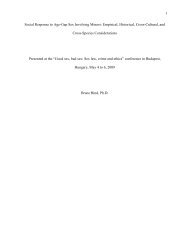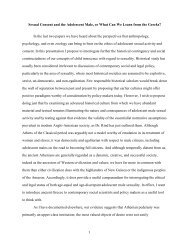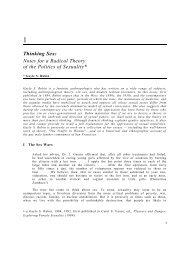PDF file - Ipce
PDF file - Ipce
PDF file - Ipce
Create successful ePaper yourself
Turn your PDF publications into a flip-book with our unique Google optimized e-Paper software.
Part_5_2<br />
not all consequentialists can be called utilitarians. Broadly speaking, my own belief is that<br />
aiming for the greatest happiness of people in general is about the best we can do in terms of<br />
ultimate ethical goals. Apparently different goals, such as service to others, and the<br />
encouragement of virtues such as courage, honesty, artistic appreciation and so on are really<br />
only sub-sets, or aspects, of a happy society. So, I am a utilitarian, which also means I am a type<br />
of consequentialist. And I am a paedophile. Lots of big words!<br />
Opponents of consequentialism support several different theories. One of these is natural law<br />
theory, the idea behind this being that we have, within our own nature, a guide to what is good<br />
for us. If we follow our own nature we will flourish. This thinking derives from figures such as<br />
Aristotle and St Thomas Aquinas but is also very modern - many people today think we should<br />
study our evolutionary genetic and behavioural development in order to discover the kinds of<br />
behaviour most "natural" to us. As developed by theologians, natural law theory, however,<br />
became very unempirical and indeed highly artificial and unnatural.<br />
Of much more importance to us is an alternative natural law tradition that started with John<br />
Locke in the 17th century. This body of theory was based on rights that supposedly exist in a<br />
state of nature and are retained even in modern society. This view of rights had a major<br />
influence on the development of the American constitution and thereby on the whole idea of<br />
human rights. But why is the idea of rights so important? Why can't we just say we must each<br />
act in ways consistent with maximizing the sum total of happiness?<br />
This question brings us up against a major problem, a major clash of moral sentiments.<br />
Classic example<br />
The classic illustration of this is to imagine seven sailors in a lifeboat. They have enough water<br />
on board but they are starving. They have six strong oarsmen who calculate they can reach<br />
land before they die but only if they can keep their strength up by eating. The seventh sailor is<br />
a little cabin boy who isn't strong enough to row but would be very good to eat. The six rowers<br />
can eat him, and survive, or all seven will certainly die unless there is a very unlikely rescue.<br />
Now these happen to be very brutal, nasty sailors who would not be troubled by a bad<br />
conscience over eating the boy. If they reach land they will be very happy about it. Should they<br />
eat the boy? To do so would bring the maximum amount of happiness to the group, thus<br />
satisfying the declared social aim of utilitarianism. But many people would find this idea<br />
revolting and quickly conclude it would be better for all seven to die than to have six happy<br />
survivors. Such people would be human rights advocates who would wish to set out rules, or<br />
principles, defining minimum rights, such as the right to life, which it is simply wrong to set<br />
aside even in extreme circumstances. Those same people, however, might agree that war is<br />
sometimes justifiable even though entirely innocent parties are likely to lose their lives. These<br />
matters are not simple.<br />
http://home.wanadoo.nl/ipce/newsletters/nl_e_12/part_5_2.htm (3 of 13) [10/16/2002 5:35:14 PM]
















